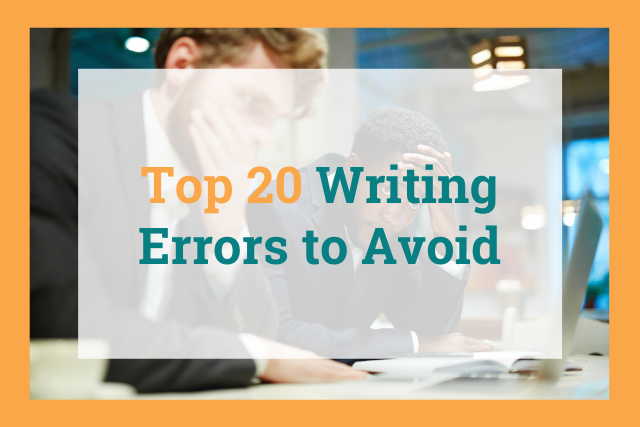
Most people write every day for work, school, personal reasons, or hobbies. However, most people aren’t writing experts. Even grammar experts make mistakes when they are writing!
Some errors are more egregious than others. No one expects the average person to know all the ins and outs of English grammar, but these twenty writing errors are some of the most basic mistakes you should avoid when writing.
Most Common Punctuation Mistakes to Avoid
Punctuation is tricky. Here are the mistakes to avoid.
1. Incorrect End Marks
When you’re in the flow of writing, you might mess up the end punctuation by accident. Sentences can end in a period, a question mark, or an exclamation point. Most sentences are statements or declarative sentences. These should end in a period.
Questions should always end in question marks. Sentences that show heightened emotion like excitement, surprise, or anger are exclamatory sentences. They should end in exclamation points.
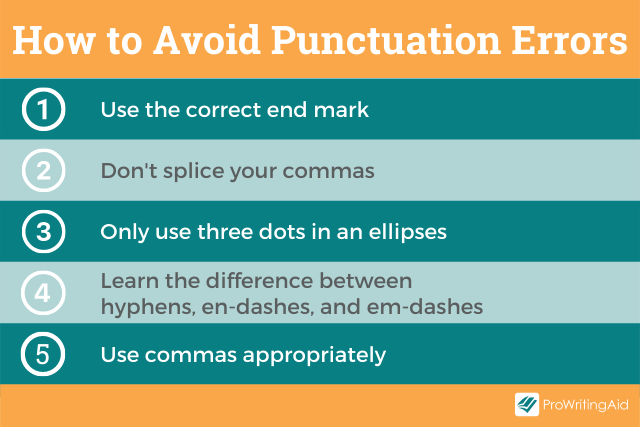
2. Comma Splices
A comma splice occurs when two independent clauses are combined with nothing more than a comma. Independent clauses are clauses that can stand alone as a sentence. They have a subject and a verb.
There are two main ways to combine independent clauses in the same sentence. First, you can use a semicolon. This is the easiest way to get rid of comma splices. You can also use a comma + a coordinating conjunction.
Here’s what this looks like:
Comma splice (incorrect): I went to the grocery store, they didn’t have any milk.
Semicolon (correct): I went to the grocery store; they didn’t have any milk.
Comma + conjunction (correct): I went to the grocery store, but they didn’t have any milk.
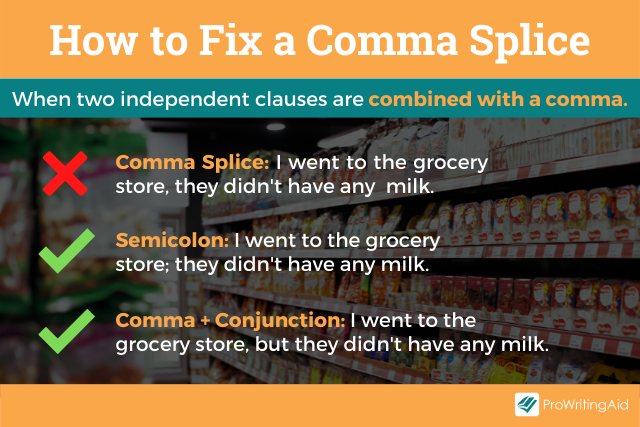
Other ways to get rid of a comma splice include using other punctuation like em dashes or colons, making one clause a dependent clause with a subordinating conjunction, or separating the clauses into two sentences.
3. Too Many Dots in an Ellipsis
One common error people make is misusing the ellipsis. An ellipsis (...) is used to show thoughts trailing off or to omit words.
The biggest mistake with the ellipsis is using too many dots! An ellipsis only contains three dots. No more, no less. Some style guides allow you to add a period after an ellipsis, so it looks like four dots. But the ellipsis itself is only three!
4. Hyphens Instead of Dashes
Hyphens, en dashes, and em dashes are three very different punctuation marks. A hyphen (-) is one small line typically used to connect two or more words or parts of words (e.g. ex-boyfriend, merry-go-round, skin-tight.)
An en dash (–) is used to show a range, such as a timeframe, numerical range, or serial order. For example, you might write January–March, 2000–2005, or an alphabetical range like Ca–Ch. It’s longer than a hyphen and shorter than an em dash.
An em dash (—) has many uses. It’s the length of two hyphens, but it’s incorrect to just place two hyphens next to each other. Some programs will autocorrect this into an em dash, but others won’t. If you have a numerical pad, write it by using the alt code ALT+0151.
5. Missing Commas
Commas help prevent sentences from becoming run-on sentences. Here are some places to always include a comma:
- Before a coordinating conjunction
- After a dependent clause at the beginning of a sentence
- Between items in lists
- When setting off interjections
This isn’t an exhaustive list of when to use a comma, but it’s a good starting point. If you learn these rules, you’ll cut down on your missing comma mistakes drastically.
No one expects you to know all the comma rules. After all, ProWritingAid exists and will highlight where you’ve missed a comma in your writing.
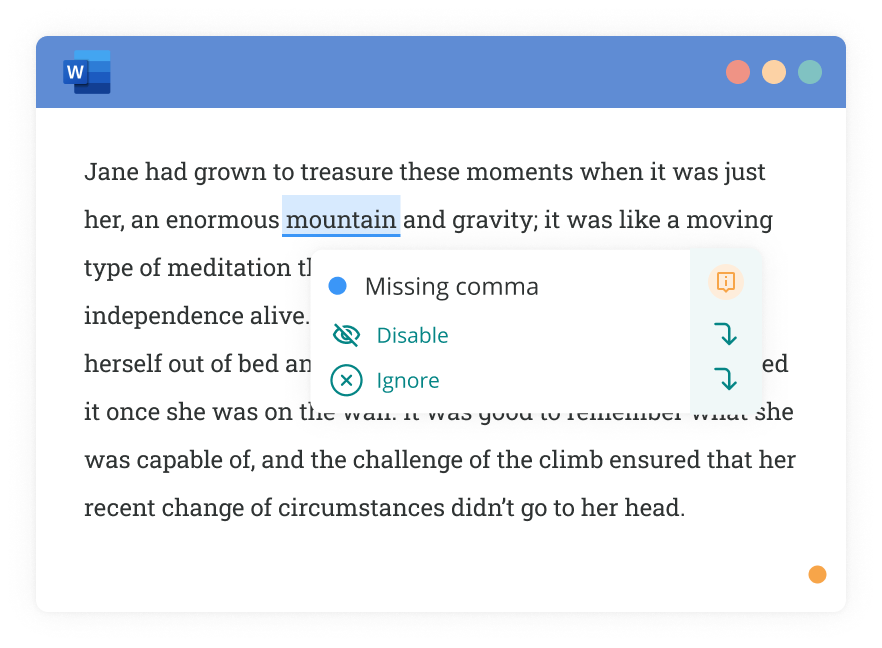
Most Common Grammatical Mistakes Writers Make
Grammar mistakes that don’t involve punctuation are easy to make because there are just so many rules to remember! Here are five grammar mistakes that everyone should avoid.
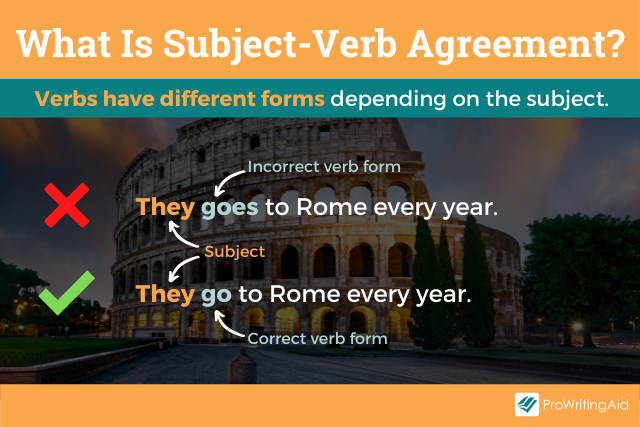
6. Subject–Verb Agreement
One of the most common grammar mistakes involves subject–verb agreement. Verbs have different forms depending on the subject. Be careful that you don’t use the wrong verb form for the subject that you’re using.
Here are a couple of examples.
Incorrect: She run fast.
Correct: She runs fast.
Incorrect: We goes to the movies every week.
Correct: We go to the movies every week.
Subject–verb agreement can be as simple as the examples above. But, there instances where using a singular verb versus a plural one can become tricky. Don’t rely on memory for all the grammar rules, use ProWritingAid to correct wrong subject–verb use.

Start correcting your writing with a free ProWritingAid account.
7. Run-On Sentences
A run-on sentence is a sentence that is not properly punctuated with commas, semicolons, or other punctuation marks. Punctuation marks, like periods, commas, and semicolons, are used to show a natural pause in speech. They help separate information so your writing doesn’t sound like someone is speaking in fast-forward mode.
Take a look at this run-on sentence:
I went to the store I needed to buy milk but they were out.
Whew! That’s a mouthful. Let’s see how punctuation can help fix this.
I went to the store. I needed to buy milk, but they were out.
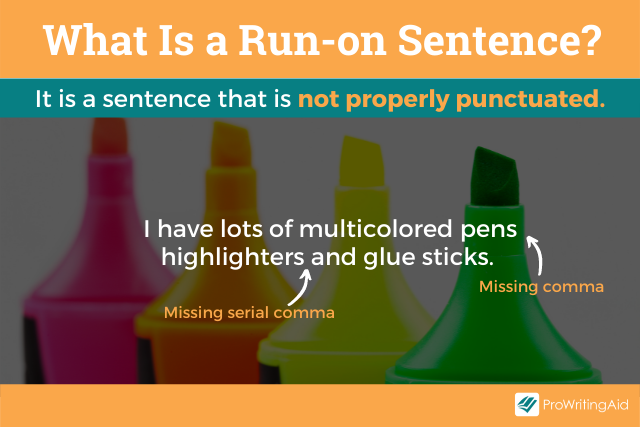
8. Incorrect Verb Tense
Not only do verbs have different forms for different subjects, they also have different forms depending on tense and mood. Use the correct tense in your writing and don't switch between tenses.
Incorrect: I went to the store next week.
Correct: I will go to the store next week.
Incorrect: I used to danced ballet.
Correct: I used to dance ballet.
9. Pronoun–Antecedent Agreement
Just like subjects and verbs need to agree, so do pronouns and their antecedents. An antecedent is the noun to which a pronoun refers. The pronoun must match in number (singular or plural) and person (first, second, or third person with matching gender).
In the example below, there are two or more teachers. The pronoun must be plural, not singular.
Incorrect: The co-teachers wrote her names on the board.
Correct: The co-teachers wrote their names on the board.
10. Sentence Fragments
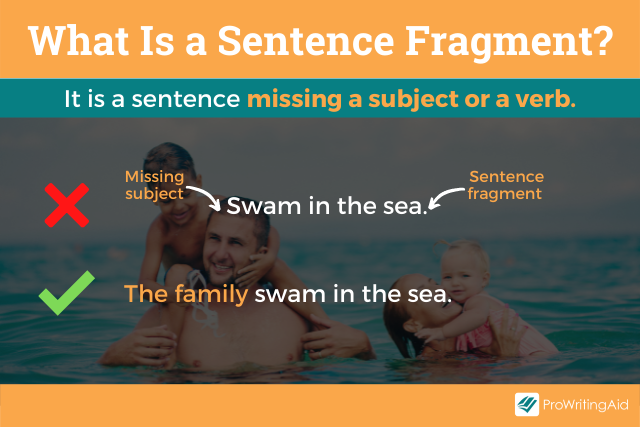
To be a standalone sentence, a sentence must contain a subject and a verb. If it doesn’t have both, it is a sentence fragment.
Incorrect: Goes to the movies on Sundays.
Correct: She goes to the movies on Sundays.
Most Common Spelling Errors Writers Make
The most common spelling mistakes involve homophones, or words that sound the same. Here are five sets of homophones that you should know to improve your writing.
11. There/They’re/Their
There is an adverb that usually refers to a location, e.g. Put it over there.
They’re is a contraction of they + are, e.g. They’re getting married next month.
Their is a possessive pronoun, e.g. Who is catering their wedding?

12. Its/It’s
Its is a possessive pronoun, e.g. Where is its owner?
It’s is a contraction of it + is, e.g. It’s snowing outside!
13. To/Too/Two
To is a preposition, e.g. Fly me to the moon.
Too is an adverb that means in excess or also, e.g. She is too short for the ride.
Two is the written form of the number 2, e.g. We’ve been together for two years.
14. You’re/Your
You’re is a contraction of you + are, e.g. You’re my best friend.
Your is a possessive pronoun, e.g. Here is your book.
15. Than/Then
Than is a preposition used for comparisons, contrasts, or exceptions, e.g. He is taller than his brother.
Then is an adverb, usually dealing with time, e.g. Back then, I lived in Manhattan. Then I moved to Los Angeles.
Most Common Writing Errors to Avoid
Some writing mistakes aren’t necessarily grammatical errors, but they still hurt the clarity of your writing. Here are five common writing mistakes that are more than spelling and grammar errors.
16. Sentence Sprawl
Sometimes, we might write sentences that are just too long. They aren’t run-on sentences because they are punctuated correctly. But superfluous commas and too many equally weighted phrases can bog down your writing.
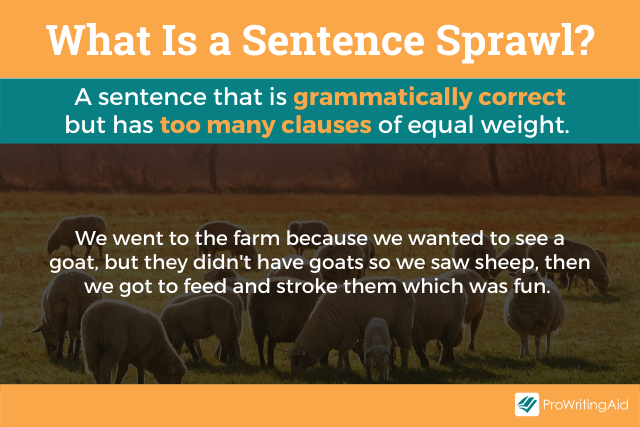
Here’s an example:
We went to the grocery store because we needed milk, but they were out of milk, so we went next door to the convenience store, and they had milk, but it was so expensive.
All of those commas are correct, but it reads like we are rambling! Separate sentences like this to prevent sprawl.
17. Vague Pronoun Reference
If you’re writing a sentence with multiple nouns that have the same pronoun, it’s easy to confuse readers with vague pronoun use.
Vague: Dad told Jeremy to fuel up his car before he left.
Does "his" refer to Dad or Jeremy? What about "he?" Reword sentences like this to be clearer.
18. Faulty Parallelism
Parallel structure refers to using the same pattern of words or phrases in a sentence. The structure should match throughout a sentence.
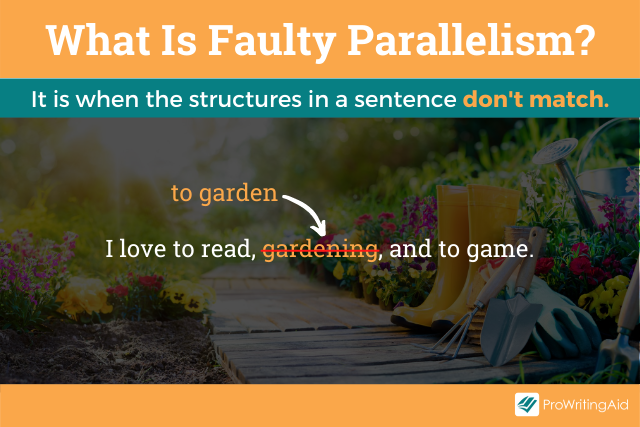
Incorrect: I like to dance, to cook, and swimming.
Correct: I like to dance, to cook, and to swim. OR I like dancing, cooking, and swimming.
19. Incorrect Word Choice
Avoid using the wrong word when you write so that your meaning is clear. Even words that are synonyms might not be interchangeable. For example, your grandma might be old but she isn’t antique or fossilized! Pay attention to connotation and tone when choosing synonyms.
20. Wordiness
Even if your grammar and spelling are perfect, wordiness can make your writing hard to read. Be succinct and clear in your writing.
Whenever you are unsure about a writing error, ProWritingAid can help. Try our editing tool for spelling, grammar, punctuation, and style mistakes!


